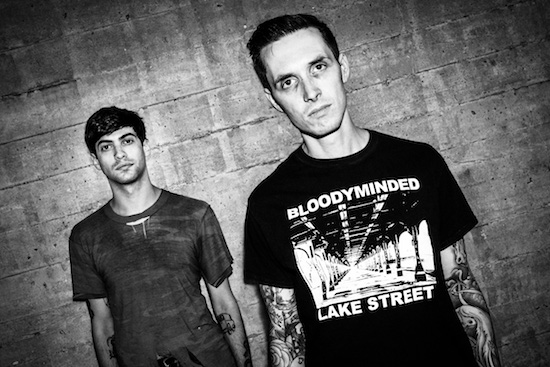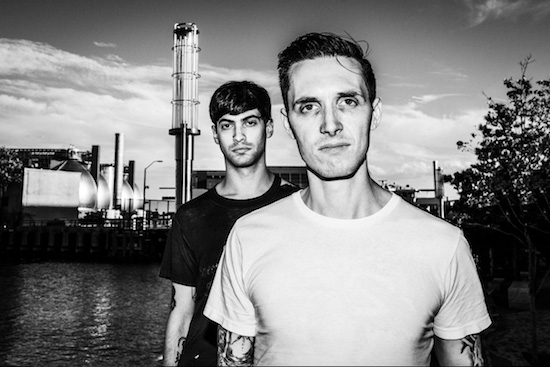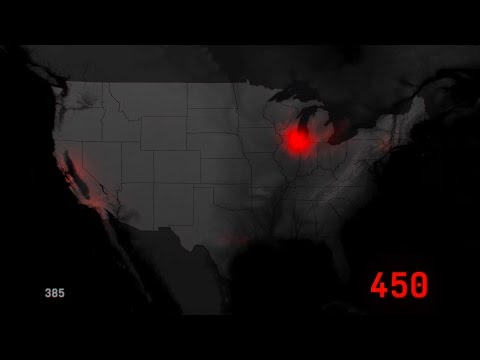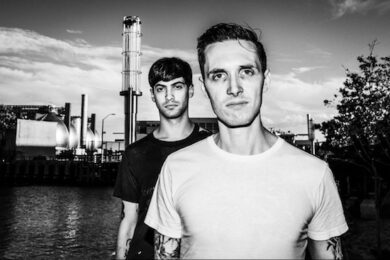Portraits by Samantha Marble
Wake In Fright, the second album by New York duo Uniform, is a record for all seasons, eras, moods and climates. Ben Greenberg and Michael Berdan work with a vocal/guitar/drum machine setup that echoes the punk-baiting bare bones of Suicide, Big Black’s combative squall and all manner of early-90s industrial metal crossover gambits. It’s joyous by virtue of being so invigorating, but not a cheerful record by any other yardstick.
Berdan, Uniform’s vocalist, prefers to keep his lyrics close to his chest as much as possible. There’s a stated theme of sorts which runs through Wake In Fright, however: a series of characters attempt to deal with their crappy or otherwise disappointing lives through self-destructive, self-defeating means, plunging into addictions or lashing out at a world that failed them. Or, as Greenberg puts it in the album blurb on Uniform’s Bandcamp: “We are surrounded by war and the whole world is burning and it doesn’t seem like there are any appropriate reactions or responses left anymore.”
The temptation, then, is to claim this as an early example of the post-Trump sonic protest that some people want very badly to happen. This wish, while a corny exercise in missing the wood for the trees, is understandable – and, as I say, Wake In Fright can serve that function for you, if you insist. Perhaps it’s instructive, though, to remember that there’s a world which, regardless of who’s in the noteworthy seats of power, has always been bleak, violent and ugly.
Three adjectives which Uniform decisively own here: if 2015 debut album Perfect World revelled in its cheap equipment and scuzzy aesthetic, Wake In Fright (and Ghosthouse, a recent three-song 12-inch) uses the studio, and Greenberg’s own production smarts, to ramp up the sheer power. He and Berdan spoke about it, and plenty of other stuff, via email.
When were the lyrics for Wake In Fright written? Do they attempt to capture a moment or moments in time?
Michael Berdan: They were put together over the fall of 2015 and the winter/early spring of 2016. I never really stop writing and a lot of what I say is a patchwork of ideas from different times, so I can’t say anything for capturing a specific moment. I explored some lifelong constants on this record, namely insomnia and how that relates to anxiety and an absence of hope for a positive future. I looked at the town I grew up in and the type of people that I’ve always become close to, and I started to come across these common threads of desperation. This record is about how we all try to deal with the devils and the angels on our shoulders.
How fleshed out is each character? Could you tell me much about them that isn’t contained in the words the listener hears?
MB: Most of them aren’t particularly fleshed out at all. Rather, these are stream of consciousness inner dialogues that the individual is experiencing as it relates to a particular situation. ‘Tabloid’ is about someone noticing how one negative thought spirals into another, with no means of respite. ‘Habit’ and ‘Bootlicker’ deal with the same chronic alcoholic. During ‘Habit’, he wants to stop drinking but is physically unable; by the time ‘Bootlicker’ comes around, he has managed to clean up for a period of time but all of the feelings that drove him to the bottle in the first place have come flooding back.
‘The Lost’ is very much about my hometown, where a large number of people that I grew up with are either in and out of prison or dead. Lots of these kids grew up to repeat the same cycles that they were born into, but a few made it out. This is about a person trying to leave but feeling hopeless about that prospect. Both ‘Light At The End’ songs [subtitled ‘Cause’ and ‘Effect’] deal with a long term substance abuser at different points of their using. During ‘Cause’, the character does not care who they hurt in the pursuit of oblivion. Their nihilism justifies all kinds of abhorrent behaviour. By the time ‘Effect’ comes around, that same person has become remorseful but so chemically dependent that they can’t imagine stopping. ‘Night Of Fear’ directly relates to my own lifelong struggle with insomnia. These are the thoughts I have at 3am when I can’t sleep and the world is ending.
A lot of these song titles have been reappropriated from exploitation movies and pulp horror novels: Habit, The Light At The End, The Lost, The Killing Of America. Night Of Fear is the title of an Australian horror film from 1972, the same year that the movie Wake In Fright came out.
Given that it’s not super easy to make out the words, why isn’t there a lyric sheet with the album?
MB: I never include lyric sheets. There are a couple of reasons for this, but the primary one is a fear of misinterpretation. I talk about ugly things in an ugly way. Some people may view my words as an endorsement of that ugliness when it’s truly not.
In the biog for this album (on the Bandcamp page) you talk about “old ways of thinking / living / coping” and how they are becoming obsolete or untenable. Could you expand a bit more on what you had in mind here?
MB: I mean the things that make you feel good or numb eventually stop serving their purpose. When that happens, one needs to change direction or succumb, although I believe that no-one is ever truly trapped. As long as we are alive there is a chance to change and find both purpose and peace.
It struck me as something which could be applied to social conservatives having to accept that progressive politics have made headway, or left/liberal-minded people who assumed that appealing to reason and decency would suffice to win an election.
MB: I’m mainly talking about human experiences that transcend politics. With the exception of ‘The Killing Of America’, which is about gun violence in the States, none of these songs are meant to speak to anything more than a feeling that a character is experiencing. Yes, the personal is political and all, but I choose to lean heavily on the personal side here.
Nobody saw the Trump victory or Brexit coming when we wrote this record. Perhaps our subject matter would be different had the words to these songs been written today, instead of a year ago.

Do you feel like Wake In Fright is an album that comments on the age we’re living in? Ben’s quote, “We are surrounded by war and the whole world is burning,” I take to refer to specific events of 2016… although you could say it in any given year and it would have some validity, right?
Ben Greenberg: I wasn’t referring specifically to 2016, no. It’s about a lifetime of being surrounded, overwhelmed, helpless. I think it’s hard to deny that you can apply a lot of the more personal themes on this record to larger situations, inasmuch as that’s something everybody does when they really listen to music. That’s the whole point of songs, right? When a song grabs you, it sparks your brain, your mind starts finding ways to relate and connect with it.
MB: There hasn’t been a period in my life that I haven’t felt the world to be on fire in one way or another. Obviously things have only gotten worse but this dread well predates the horrors of 2016. I’ve always felt that it was only a matter of time until the collapse of the West, either through massive shift in consciousness, a revolution that ends with the eradication of capitalism, or a large-scale nuclear war. Time will tell what happens first, but it won’t be long now.
What major differences in production methods are there between Perfect World and Wake In Fright? The first album made a virtue of low-grade equipment but the new one seems like it’s tweaked for maximum brutality.
BG: Our process has changed dramatically, yeah, but the underlying themes are very much the same: volume, economy, severity, in that order. Perfect World was made with one bass synth and one drum machine, which is a very narrow palette to work with. I always want as few options as possible – it forces me to be creative – but we wanted to see if we could get a bigger sound and still keep things relatively simple.
We settled on samples. I started obsessively sampling movies, sound effects records, Foley tracks, other people’s drum machines haha. Eventually I had a hard drive full of samples, and then it was about what layered well, and what didn’t.
There’s a lot more metal influence on Wake In Fright and Ghosthouse than on previous Uniform recordings.
MB: I’ve always been drawn to extreme music. After Perfect World I felt like we could either speed up or slow down. For this record, we sped up. Maybe the next album will be different? We never want to stop evolving.
BG: If we’re going to be as loud, intense, overwhelming as possible, then we have to push ourselves. We had already started to experiment with dense layers of hyper-fast quantized drum hits on our drum machine, which was one way to push that piece of gear to overload itself and do crazy unpredictable things. It made sense to try that approach with Pro Tools as well.
Are you now or have you ever been a fan of that industrial metal crossover hinterland that blew up in the 90s and was arguably responsible for nu-metal?
MB: Ha! I started discovering music on my own in the early 90s and it would be a horrible lie to say that industrial metal wasn’t a part of that. Nailbomb’s Point Blank was a pivotal record of my adolescence, as well as those Killing Joke, Godflesh, and Ministry albums from that era. Fear Factory had as much of an impact on me as the Cro-Mags or Morbid Angel.
Do you think of Uniform as a punk and/or hardcore band? Did you ever?
MB: I feel like we are something more open-ended than that. We’ve both played in punk and hardcore bands and certainly a degree of our songwriting comes from those traditions but that’s where it stops. As individuals, on a personal and political level, I feel confident that we’ll forever self-identify as punks. The band is something different, though.
Do you see it as a success or failure of punk that, 40 years after it became a genre, its commonly understood musical setup is basically unchanged?
MB: I’m fairly ambivalent about what physically constitutes the makeup of a punk band. Punk is a state of being that transcends genre. The household definition of what makes a punk band can stay how it is forever and ever. Real heads will know that when they are watching Wetware or Ron Morelli, they are dealing with punks, through and through.
BG: It’s been pretty cool watching a bunch of the current punk bands in NYC flourish over the past bunch of years. Those kids are mostly younger than us, and they go for it so hard, and that’s so palpable in everything they do, I still find that super magnetic. They’re all really talented and creative, I don’t think punk is a failure at all.
Do either of you have any other bands/projects on the go right now?
MB: I still play with Ryan Martin (Copley Medal/Dais Records) in York Factory Complaint. Both he and I have intense work and family schedules so it’s more part time these days, but by all means we’re still active. I’m 36 years old and there is a good deal that I’m responsible for at this point in my life. Uniform takes time, physical/psychic energy, and passion. I’m beyond grateful that this is my life and I get to do it.
BG: I’m still playing a few Hubble shows a year, and I’m always recording solo guitar music at home. The majority of my time outside of Uniform is spent producing and engineering, though. That’s my job, full time, and I couldn’t be happier. My life is completely freelance, but playing in a band and recording other bands was all I ever wanted to do with my life. So I guess I can die now?
Do you see Uniform as a project that could continue for a long time?
MB: I get to make music with one of the best human beings that I’ve ever met. Barring death or some unforeseen and intensive falling out, I don’t see a reason that we’d ever need to break up. We genuinely enjoy each other’s company to a point that it would make no sense for us not to do this.
BG: Who can say how long a band is going to last? We’ve both been in a lot of them. Some bands I’ve done have lasted years, some months; one time I quit a band at, like, the second rehearsal, haha. I think we have a pretty good thing going here, so hopefully we can do it a little longer before the world ends.
Wake In Fright is out now on Sacred Bones




